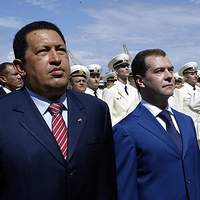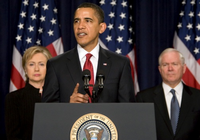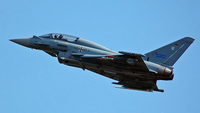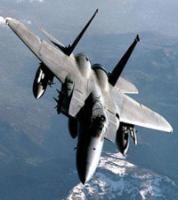U.S. President Barack Obama announced a new phased, adaptive approach for missile defense in Europe, a revision of the Bush administration’s 2007 plan for missile defense. The administration says the new approach is based on an assessment of the Iranian missile threat, and a commitment to deploy technology that is “proven, cost-effective, and adaptable to an evolving security environment.”
Europe Archive
Free Newsletter
I personally identified with Stephen Walt’s mea culpa post regarding his own and America’s strategic ethnocentricism regarding what’s called “Africa’s World War.” As a result of reviewing submissions here at WPR, my own understanding of the various interwoven conflicts in Central Africa has risen slightly from total to simply near-total ignorance. But for probably many of the reasons Walt lists, although I periodically register the enormity of the human tragedy there, it’s not something I spend a great deal of time thinking about or studying. And when you’re dealing with over 5 million deaths in a decade, that kind of […]
A little bit more on the deal to buy 36 Rafale fighter jets announced by Brazilian President Lula da Silva alongside French President Nicolas Sarkozy, only to be semi-retracted pending final assessment of the competing tenders. Jean-Dominique Merchet passes on a Les Echos article (sub. req.) that sheds light on some of the backroom wrangling that went on. And it turns out U.S. President Barack Obama really went to the mat to get the Boeing F-16 offer back in the running. Merchet’s post, coming as it does from the French perspective, is titled, How Obama Tried to Shoot Down the […]

Venezuelan President Hugo Chavez’s latest visit to Moscow resulted in a package of arms and energy deals that highlight the mutually beneficial nature of the current Russian-Venezuelan relationship. Facing declining purchases from traditional arms clients, such as India and especially China, Russia has sought to compensate by expanding arms sales to new markets, including in Latin America. For the most part, however, Russian sellers have not been able to achieve major successes, despite Latin American countries doubling the volume of weapons they purchased between the periods of 1999-2003 and 2004-2008. Although the share of Russian arms exports going to Latin […]

During the last several weeks, Americans have found themselves back in the middle of a fierce debate over our continuing military effort in Afghanistan. What was Bush’s forgotten war had, until recently, seemed quite safely transformed in public opinion into Obama’s “war of necessity.” Now, because of Gen. Stanley McChrystal’s request for significantly more troops, coming on the heels of his public declaration that the Taliban are essentially “winning,” the ruling Democrats have suddenly been thrust back into “quagmire” mode. Predictably, we are once again awash in feverish Boomer analogies to Vietnam, despite the pronounced absence in Afghanistan of any […]

Last week, the United Nations Conference on Trade and Development (UNCTAD) issued a report calling for sweeping changes in the international financial and monetary order. Arguing for a reduced role for the dollar, the report advocated for a global reserve bank with the power to issue its own currency, to monitor its members’ national exchange rates, and to prop up or push down their currencies. In other words, UNCTAD is making the case for a global central bank. The U.N. is not alone in calling for such a move. Since the eruption of the global financial crisis last fall and […]
Just a few followup items I thought I’d get into the habit of posting: – With regard to my observation about the lack of Iraq or Afghanistan War literature or cinema, Jonathan Bernstein makes the obvious point, which I myself had noticed on reading the post afterwards, that all the novels and films I mentioned with regard to WWII and Vietnam were published or released well after the end of those wars. He also makes a less obvious, but just as astute, observation about the relation between a war’s popularity and the kind of works of art (propaganda vs. critical) […]
Inevitably, Republican South Carolina Congressman Joe Wilson’s heckling of President Obama on Wednesday, and other shouted remarks reported by (among others) Dana Milbank in the Washington Post drew comparisons with the habitual rowdiness that British prime ministers face in the House of Commons. To many commentators it recalled the political theater of a Tony Blair or — for those with longer memories — a Margaret Thatcher deftly handling members’ questions despite the barrage of catcalls and shouted remarks. The session takes its toll. This correspondent, who once worked briefly for Prime Minister Thatcher, can report that after the cut and […]
Beset by reports of a sex scandal, Italian Prime Minister Silvio Berlusconi accused the press of falsehood. The charge is unfair: Nobody could make this stuff up. At a joint press conference with visiting Spanish Prime Minister Jose Luis Rodriguez Zapatero on Wednesday, Berlusconi was as defiant as ever in fielding questions from a Spanish journalist. The subject, of course, was hardly Italian-Spanish relations. Berlusconi was asked about an Italian businessman’s claim that he had sent or accompanied to the prime minister’s residence about 30 young women — some of whom had said they were willing to have sex, and […]
James Joyner tackles one of the more irritating refrains used to argue for the need to succeed in Afghanistan — namely, the claim that NATO’s credibility will not survive failure there. I’d add that to the extent that NATO tried to reinvent itself as an alliance that would project force in out-of-theater operations, there’s a kernel of truth to the claim that Afghanistan has damaged its credibility. But it’s not so much success or failure in Afghanistan that are to blame, but rather NATO’s dismal failure to create a unified chain of command with uniform rules of engagement of the […]
It looks like the deal for Brazil to buy 36 French Rafale fighter jets might not be as final as Brazilian President Lula da Silva made it out to be. To begin with, there’s the little technicality, raised by the miffed Air Force command, that its final analysis of the three competing craft (Boeing’s F-18 and Saab’s Gripen, in addition to the Dassault Rafale) isn’t due until late-October. Deviating from that schedule, says Jean-Dominique Merchet, could open the door to legal challenges by the competition. It also risked stepping on some toes in the Brazilian legislature by bypassing the defense […]
My response to Sam Roggeveen yesterday was a bit tongue-in-cheek. So to clear up any misunderstanding, Roggeveen is suggesting that France is an exception to the “Roggeveen Rule,” in that it is a civilian democracy that also exhibits a passion for “Red Square-style” military parades. And I was suggesting that the civilian leadership is indeed firmly in control here, as far as I can tell, but that French political culture has been deeply marked by at least two generals: The modern French state is essentially the product of Napolean Bonaparte, and the Fifth Republic the product of Charles de Gaulle. […]

BERLIN — The German public and many left-leaning members of parliament have expressed shock and anger over Germany’s role in an airstrike in Afghanistan last week that killed an as-yet-undetermined number of Afghan civilians. The airstrike on two hijacked gas tankers was called in by a German commander in Afghanistan’s Kunduz province, reportedly based on grainy video footage and the assurance of just one on-the-ground informant that those surrounding the trucks were all Taliban insurgents. The German people, deeply pacifist since the end of World War II, are largely opposed to the NATO mission in Afghanistan, as well as Germany’s […]
Roggeveen calls this “Grunstein bait.” Okay, I’ll bite. But what’s really Grunstein bait is the fighter jet flyovers for the Bastille Day parade that got me scurrying down to the Seine for an unobstructed view. I was going to write that besides the sweet and low-flying formations of Rafales and Mirages, the parade itself usually doesn’t feature heavy arms, just armored personnel carriers and some cannons and the like. But then I found a photo of a formation of Leclerc tanks from the 2007 parade. (Couldn’t tell if they were camouflaged or just covered in rust and duct tape.) There […]

The four nations involved in the Eurofighter Typhoon military aircraft consortium signed a long-awaited contract in late July to buy more of the controversial fighter jets. The breakthrough represents a much-needed financial boost for a program central to European defense cooperation, one that, like other European defense projects, has been dogged by technical problems and spiraling costs. The $13 billion deal between Britain, Germany, Italy and Spain for another 112 Eurofighters followed many months of debate over the cost of keeping production lines open amid growing concerns over budgets and defense priorities. Under the original Eurofighter umbrella contract signed in […]

A study by the Congressional Research Service (CRS) found that U.S. arms sales surged last year, despite the worst global economic downturn in decades. (UPDATE: WPR subscribers can download the CRS report here.) In 2008, U.S. arms dealers signed new weapons contracts worth approximately $37.8 billion, a considerable increase from previous years. The surge was remarkable given that the total volume of new arms orders in 2008, $55.2 billion, was billions of dollars below the comparable figures for 2007 and 2006. The United States also fortified its position as the leading arms-exporting country. Last year, the volume of global defense […]
A few weeks back, Natalie Nougayrède wrote about the disappearance of human rights from Nicolas Sarkozy’s foreign policy agenda since last December. That got me thinking about the disappearance of foreign policy from Nicolas Sarkozy’s foreign policy agenda since last December. After a very active first two years in office, culminating in France’s EU presidency from July-December 2008, Sarkozy has been almost nonexistent in the international arena — outside of a brief supporting role in the runup to the London G-20 summit in April, and the opening of a minor French military base in Abu Dhabi in late-May. Part of […]
